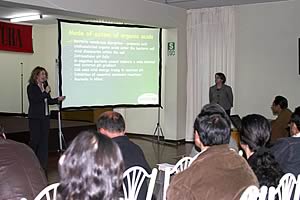19/09/08
UK poultry salmonella specialist Dr Lin Wylie from Kiotechagil has emphasised the critical need to use organics acids in the battle to control salmonella in South American poultry farms.
Dr Wylie from Kiotechagil presents in Peru
 |
Speaking to poultry producers, vets and nutritionists in Peru, Dr Wylie said, “the organic acids in SALKIL assist in the acidification of the bird’s entire digestive tract providing a controlled release of acids, to assist the development of beneficial gut microflora. These protected organic acids are capable of resisting immediate digestion in the intestine and can help control Gram negative enteropathogens from all sources.”
In a study of free-range chickens in Peru, the frequency of Salmonella positive isolates was 54 per cent.
The transmission of salmonella to humans by contaminated poultry products is an important public health issue and can be particularly serious in children and the elderly. Salmonella can be passed from poultry to humans via eggs or meat and it is consistently among the leading bacterial causes of food-borne human illness.
“Salmonella infection in poultry adversely affects gut health and the absorption of nutrients by the chicken resulting in poor growth performance or reduced egg production" added Dr Wylie. “Therefore the need to implement effective control measures to reduce the incidence of salmonella infections in chickens is an urgent priority for the industry. Control of salmonella at the feedmill alone will not eliminate salmonella from post manufacturing contamination from a variety of sources including insects, water supplies, horizontal transmission within flocks or from farm workers. The only thorough approach is to use protected acids that are safe to use, protect the feed from recontamination and continue to work from the feedmill through to the hindgut of the bird.”
 Sourcing Sheep and Cattle from the Blue Tongue Free Area Sourcing Sheep and Cattle from the Blue Tongue Free Area
 Outbreak of Peste des Petits Ruminants in Morocco Outbreak of Peste des Petits Ruminants in Morocco
 Defra's Proposed Animal Health Tax Can Be Avoided Defra's Proposed Animal Health Tax Can Be Avoided

|




